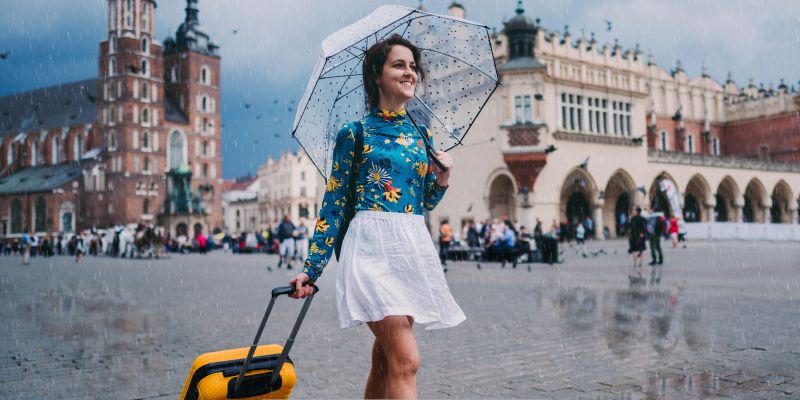Before embarking on any journey, thorough research about the destination is essential. Understanding the local culture, customs, and traditions can significantly enhance the travel experience. Travelers should delve into the history of the place, as this knowledge can provide context to the sights they will see and the people they will meet.
For instance, knowing the significance of a historical monument or a local festival can transform a simple visit into a meaningful encounter. Additionally, familiarizing oneself with local laws and regulations can prevent unintentional faux pas that might lead to misunderstandings or legal troubles. Moreover, researching the climate and geography of the destination is equally important.
This information helps in packing appropriate clothing and gear, ensuring comfort throughout the trip. Travelers should also look into local cuisine, popular attractions, and off-the-beaten-path experiences that can offer a more authentic glimpse into the destination. By gathering insights from travel blogs, forums, and guidebooks, individuals can create a well-rounded picture of what to expect, allowing them to plan their itinerary effectively and make the most of their time away.
Key Takeaways
- Research your destination to understand the local customs, laws, and potential safety concerns
- Share your itinerary with someone you trust, including details of your accommodation and transportation
- Keep important documents safe, such as your passport, travel insurance, and emergency contact information
- Stay aware of your surroundings and be cautious of any suspicious behavior or potential risks
- Trust your instincts and avoid situations that make you feel uncomfortable or unsafe
- Use reliable transportation options and avoid traveling with unlicensed or unregistered providers
- Keep emergency contacts handy, including local authorities, embassy or consulate, and trusted friends or family members
- Avoid sharing too much on social media to protect your privacy and avoid attracting unwanted attention
- Stay connected with regular check-ins with friends or family to update them on your whereabouts and well-being
- Pack light and smart to avoid carrying unnecessary items and to make your travel experience more convenient
- Learn basic phrases in the local language to communicate with locals and navigate your way around the destination
Share Your Itinerary with Someone
Emergency Preparedness
In the event of an emergency or unexpected situation, having someone who knows your itinerary can facilitate quicker responses and assistance. In addition to sharing your itinerary, it is wise to establish regular check-ins with your designated contact person. This could be through text messages or phone calls at predetermined times.
Staying Connected
Such communication reinforces safety and allows for updates on any changes in plans. Furthermore, it fosters a sense of connection with those back home, making you feel less isolated while exploring new places.
Enhancing Personal Safety
Ultimately, sharing travel plans is a simple yet effective way to enhance personal safety during adventures. By taking this crucial step, you can enjoy your travels with greater confidence and peace of mind.
Keep Important Documents Safe
Traveling often involves carrying essential documents such as passports, visas, identification cards, and travel insurance information. Keeping these documents safe should be a top priority for any traveler. One effective strategy is to use a travel wallet or pouch that can be worn under clothing or kept close to the body.
This minimizes the risk of loss or theft while navigating busy airports or crowded tourist spots. Additionally, travelers should consider making photocopies or digital scans of important documents and storing them securely online or in a separate location from the originals. In case of loss or theft, having copies readily available can expedite the process of obtaining replacements.
It is also advisable to familiarize oneself with the local procedures for reporting lost documents and obtaining emergency replacements. Knowing where to go and whom to contact can save valuable time and reduce stress during an already challenging situation. By taking proactive steps to safeguard important documents, travelers can focus on enjoying their adventures rather than worrying about potential mishaps.
Stay Aware of Your Surroundings
| Location | Time | Activity | Observations |
|---|---|---|---|
| Shopping Mall | 3:00 PM | Walking | Noticed a person acting suspiciously |
| Public Park | 10:00 AM | Reading | Observed a group of people gathering and being loud |
| Office Building | 8:00 AM | Working | Noticed an unfamiliar person wandering around |
Maintaining awareness of one’s surroundings is vital for personal safety while traveling. This means being conscious of the environment, including the people around and any potential risks that may arise. Travelers should avoid distractions such as excessive phone use or wearing headphones in unfamiliar areas, as these behaviors can make them more vulnerable to theft or other dangers.
Instead, they should engage with their surroundings by observing local customs and behaviors, which can provide valuable insights into how to navigate different situations. Additionally, being aware of local emergency services and resources can be beneficial. Knowing where to find help in case of an emergency—whether it’s a police station, hospital, or embassy—can make a significant difference in critical situations.
Travelers should also trust their instincts; if something feels off or uncomfortable, it is wise to remove themselves from that situation promptly. By staying alert and informed, individuals can enhance their safety and enjoy their travels with greater confidence.
Trust Your Instincts
Instincts often serve as an internal compass guiding individuals through unfamiliar situations. When traveling, it is essential for individuals to trust their gut feelings about people and places. If something feels wrong or if a situation seems suspicious, it is crucial to listen to that inner voice and take appropriate action.
This might mean avoiding certain areas after dark or declining offers from strangers that seem too good to be true. By prioritizing personal safety over social niceties, travelers can protect themselves from potential harm. Moreover, trusting one’s instincts extends beyond immediate safety concerns; it also applies to making decisions about travel plans and interactions with locals.
If a particular activity or excursion does not feel right, it is perfectly acceptable to change plans or seek alternatives. The ability to adapt based on intuition can lead to more enjoyable experiences and prevent unnecessary stress. Ultimately, trusting one’s instincts empowers travelers to navigate their journeys with confidence and awareness.
Use Reliable Transportation
Choosing reliable transportation options is crucial for ensuring safety while traveling. Whether using public transit, taxis, or rideshare services, travelers should prioritize reputable companies known for their safety records and professionalism. Researching transportation options ahead of time can help individuals make informed decisions about how to get around in unfamiliar areas.
For instance, reading reviews or seeking recommendations from fellow travelers can provide insights into which services are trustworthy. Additionally, when using public transportation, it is wise to remain vigilant and keep personal belongings secure at all times. Crowded buses or trains can be hotspots for pickpockets; therefore, keeping bags close and being aware of one’s surroundings is essential.
If opting for taxis or rideshare services, verifying the driver’s identity and vehicle details before getting in can further enhance safety. By taking these precautions when selecting transportation methods, travelers can navigate their destinations with greater ease and security.
Keep Emergency Contacts Handy
Having a list of emergency contacts readily available is an essential aspect of travel preparedness. This list should include local emergency services numbers, such as police and medical assistance, as well as contact information for family members or friends back home who can provide support if needed. Keeping this information easily accessible—whether in a physical format in a wallet or digitally on a smartphone—ensures that travelers can quickly reach out for help in case of an emergency.
In addition to emergency contacts, it may also be beneficial to have information about local embassies or consulates on hand. In situations involving lost passports or legal issues, knowing where to find assistance can alleviate stress and expedite resolution processes. By being proactive in compiling emergency contact information before traveling, individuals equip themselves with valuable resources that can enhance their safety and peace of mind during their adventures.
Avoid Sharing Too Much on Social Media
In today’s digital age, sharing travel experiences on social media has become commonplace; however, it is essential for travelers to exercise caution when doing so. Broadcasting every detail of one’s journey can inadvertently attract unwanted attention from potential thieves or malicious individuals who may take advantage of personal information shared online. To mitigate risks, travelers should consider limiting posts about their whereabouts until after they have left a location rather than sharing real-time updates.
Furthermore, adjusting privacy settings on social media accounts can help control who sees posts and personal information. By being selective about what is shared online—focusing on experiences rather than specific locations—travelers can enjoy documenting their adventures without compromising their safety. Ultimately, maintaining discretion on social media allows individuals to share their journeys while minimizing potential risks associated with oversharing.
Stay Connected with Regular Check-Ins
Regular communication with friends or family back home is an important aspect of safe travel. Establishing a routine for check-ins—whether daily or weekly—can provide reassurance for both the traveler and their loved ones. These check-ins serve as a way to update others on one’s whereabouts and experiences while also allowing for any necessary support if issues arise during the trip.
In addition to personal check-ins, utilizing technology such as messaging apps or video calls can enhance connectivity regardless of geographical distance. Many apps offer free communication options over Wi-Fi, making it easy for travelers to stay in touch without incurring high international phone charges. By prioritizing regular communication during travels, individuals foster connections that contribute to overall well-being while exploring new destinations.
Pack Light and Smart
Packing efficiently is an art that every traveler should master for a smoother journey. The benefits of packing light extend beyond convenience; it also enhances mobility and reduces stress when navigating airports or public transport systems. Travelers should aim to bring versatile clothing items that can be mixed and matched for various occasions while considering the climate of their destination.
Additionally, packing essential items such as toiletries in travel-sized containers can save space without sacrificing personal care needs. Smart packing also involves organizing belongings effectively within luggage. Utilizing packing cubes or compression bags can help maximize space while keeping items easily accessible during the trip.
Furthermore, creating a checklist before packing ensures that nothing important is forgotten while preventing overpacking tendencies. By adopting these strategies for packing light and smartly, travelers can enjoy greater freedom and flexibility throughout their adventures.
Learn Basic Phrases in the Local Language
Learning basic phrases in the local language can significantly enhance a traveler’s experience abroad. Even simple greetings or expressions of gratitude can foster goodwill among locals and create opportunities for meaningful interactions. While many people may speak English in tourist areas, making an effort to communicate in the native language demonstrates respect for the culture and often leads to warmer responses from residents.
Moreover, knowing key phrases such as “thank you,” “please,” and “excuse me” can facilitate smoother transactions in markets or restaurants while also helping travelers navigate unfamiliar situations more confidently. Language learning apps or phrasebooks are excellent resources for acquiring essential vocabulary before departure. By embracing the local language—even at a basic level—travelers enrich their experiences and create lasting connections with the places they visit.
FAQs
What are some general safety tips for solo travelers?
Some general safety tips for solo travelers include researching your destination, staying aware of your surroundings, keeping your belongings secure, and avoiding risky areas at night.
How can solo travelers stay safe while using public transportation?
Solo travelers can stay safe while using public transportation by being aware of their surroundings, avoiding empty or poorly lit areas, and keeping their belongings close at all times.
What should solo travelers do in case of an emergency?
Solo travelers should have a plan in place in case of an emergency, including knowing the local emergency numbers, having a copy of important documents, and registering with their embassy if traveling internationally.
What are some safety tips for solo female travelers?
Some safety tips for solo female travelers include dressing modestly, avoiding walking alone at night, and staying in accommodations with good security measures.
How can solo travelers protect their personal information and belongings?
Solo travelers can protect their personal information and belongings by using a money belt or hidden pouch, being cautious with sharing personal information, and using a VPN when accessing public Wi-Fi.









